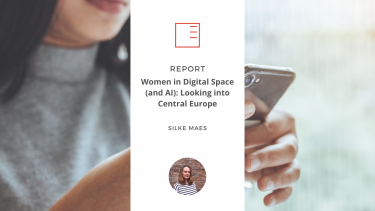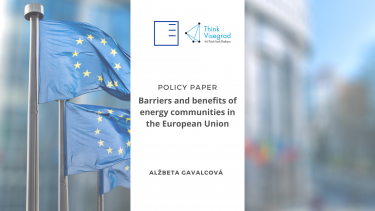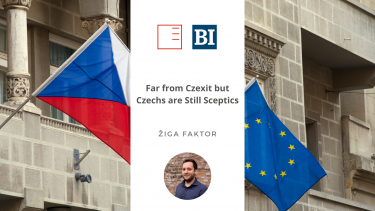Report | Women in Digital Space (and AI): Looking into Central Europe: cases from Austria, Czechia, Poland and Slovakia
Our researcher Silke Maes in her latest report addresses issues of cyberviolence on women and examines whether women in the CEE benefit from digitalisation (and AI). The report looks into how women use and contribute to the digital space, examines opportunities and challenges and proposes recommendations for a more inclusive digital space.
Show morePolicy Paper | Barriers and benefits of energy communities in the European Union
Energy communities are an effective means to decentralize and renew our energy systems with sustainable solutions as they are usually based on renewable energy. They have already started emerging in 1970´s, yet there has been a significant increase in their development only in recent years, also in terms of their introduction into the EU legislation. Especially in Western and Northern European countries the concept already enjoys vast popularity. On the other hand, in Central and Eastern European countries (further referred to as CEE) energy communities are only beginning to emerge. The policy brief (based on literature and interviews with various stakeholders ) examines the benefits energy communities may bring, and more importantly, the main obstacles remaining in their way for greater evolution in the CEE region – and especially Visegrad countries (V4). As these initiatives progress, sharing the best practices will ensure the success of the community energy in the energy transition. Writes Alžbeta Gavalcová.
Show moreBalkanInsight | Far from Czexit but Czechs are Still Sceptics
This year the Czech Republic celebrates 20 years since joining the European Union. Czechs are very sceptical about the EU, despite the fact that about 70 percent acknowledge that the Czech Republic benefits from EU membership and would vote to remain. Sceptical perceptions of the Union could be changed by the country's new pro-European leadership. Žiga Faktor, head of the Brussels office and deputy director of the EUROPEUM Institute, commented on this topic for BalkanInsight.
Show more
Novinky.cz | Migration Pact could cost the Czech Republic millions of crowns
The Czech Republic will be able to apply for an exemption from the migration pact because of Ukrainian refugees on its territory. If this exemption is not granted, the Czech Republic will either have to accept more migrants or pay a sum of up to 480 million CZK per year into an EU fund. Viktor Daněk, deputy director of the EUROPEUM Institute, commented on the migration pact for online outlet Novinky.cz.
Show moreiDnes.cz | What exactly is in the migration pact
The European Union has approved a migration pact, and from 2026 individual states will either accept their share of refugees or pay to opt out of this obligation. However, since the Czech Republic has already accepted a large number of refugees since the outbreak of the war in Ukraine, it should temporarily be exempt from this obligation. However, as noted by Viktor Daněk, deputy director of the Institute for European Policy EUROPEUM, this is not an exemption explicitly granted to Czechia. Exemptions are determined based on the number of people granted asylum or similar protection in a given country.
Show moreČT24 | The Migration Pact is about border protection, but it also brings new responsibilities
The European Parliament recently approved the Migration Pact, which, among other things, deals with the relocation of asylum seekers. Minister of the Interior Vít Rakušan claims Czechia will have an exemption from solidarity due to the number of Ukrainian refugees it accepted. The Migration Pact will take effect in two years, and its strengths and weaknesses were analysed by Viktor Daněk, Deputy Director of the EUROPEUM Institute.
Show moreCNN Prima News | European migration pact: does the Czech Republic have an exemption or not?
The Chamber of Deputies discussed the EU Migration Pact for over three hours. The opposition criticises the pact and claims that it indirectly introduces quotas. At the same time, there is uncertainty about the interpretation of a possible exemption. What does the pact stipulate and what impact could it have on the Czech Republic? Viktor Daněk, deputy director of the EUROPEUM Institute for European Policy, commented for Partie Plus on CNN Prima News.
Show moreRILSA | The uncertain fate of the Green Deal for Europe ahead of the European Parliament elections
Farmers' protests have reminded that the measures of the Green Deal for Europe may not be politically viable for Europeans. To make climate policies politically viable, the EU should therefore focus on its commitment not to leave anyone behind in the green transition. Klára Votavová, a researcher at EUROPEUM Institute for European Policy, discusses the current development of the Green Deal for Europe and its social policy aspects in an expert publication for the Social Policy Forum.
Show moreČT24 | The role of MEPs in the eyes of Czech citizens
Interest in the European Parliament elections remains low, and increased turnout is not expected this year either. The Czech perception of the European Union is partly shaped by political expressions, influencing a rather eurosceptic public perception. Although Czech MEPs have the potential to contribute significantly within the Parliament, the public has only limited awareness of their work and influence. Speculations about future positions within the ECR faction and possible commissioner positions are still premature. Viktor Daněk, deputy director of the EUROPEUM Institute, opened these topics on the evening broadcast 90’ on ČT24.
Show moreMF DNES | Cooldown in relations between the Czech Republic and Slovakia
The Czech government has suspended intergovernmental consultations with Slovak Prime Minister Robert Fico's cabinet over differing views on the war conflict in Ukraine. Our project manager Kristína Chlebáková commented on the move for MF DNES.
Show moreStaroměstské náměstí 4/1
Prague 1 - Staré Město
110 00
tel.: +420 212 246 552
email: europeum@europeum.org
https://www.europeum.org









